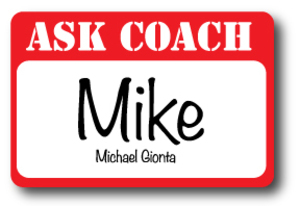I have a newspaper clipping taped to my office computer monitor . . . yes, old school paper so it sticks out to clients. It addresses the question: “What are the most common mistakes candidates make during job interviews?” According to this Accountemps survey of 1,000 senior managers, the number one mistake is having “little or no knowledge of the company”. 38% reported this as their biggest complaint.
I see this problem frequently among my clients who come in to prepare for employment interviews. One ongoing client – an IT Manager, age 53 and highly experienced – recently came in at 9am to prepare for an interview at 1:30pm that same day. His head hunter had quickly arranged four interviews with this new firm the day before, so he had little time to prepare. The first thing I asked him was, “ What do you know about this firm?”
Without hesitation, he replied, “Well, whatever they’re looking for, I’m pretty sure I have the skills. So once they tell me, I’ll know.” Big Red Flag.
So I continued, “What’s their main business?”
“I think they make Point of Sale (POS) Terminals where you swipe your credit card at checkout counters, but I’m not sure,” he replied.
His pauses had become long with a dazed, uninterested look. I knew we had Message Mapped before and practiced interviewing, and he had done well, gaining an eight month, full time, contract he had just completed as an IT Manager at another firm close to this new one. Yet, today, he was weary, in danger of coming off arrogant, and potentially about to fail in four departmental interviews just hours away!
Sadly, this is increasingly common among mid-career job hunters in their mid 40’s to mid 60’s. I give speeches to groups in this age group - my own by the way - where the faces enlivened during the presentation sink into supposed and expected rejection during the Q & A at the end. Some say they never get an interview, younger managers don’t care about them, experience doesn’t matter. I hear them. I totally do. Then I have to bring them back. Sorry folks, a convenient, negative attitude is not necessarily true, and will never get you a job.
So I said to my client, “They may not tell you what they need until they believe in you. You need to convince them by knowing something about the company. We HAVE to do some research now!”
This involves going to the company’s web site. Interview candidates should spend at least a half hour there before any interview. It discloses the company’s MISSION STATEMENT, which the candidate should know by heart and reflect in planned answers. It discloses the VOCABULARY – those famous “key words” – the company uses day to day, and the candidate should use in answers to show he/she “fits” within that corporate culture. It discloses the GOALS the company has in serving its customers – an important “home base” message the candidate should incorporate into answers. Finally, by clicking on “Careers”, the candidate can likely find and review the Job Description of the position he/she is interviewing for. This is very important way before the interview process for both mid-career professionals and those just entering the workforce. In fact, new college graduates, especially, in my experience with clients tend not to read the job descriptions in detail first before blasting out dozens of resumes with generic cover letters, a big mistake to be addressed in another column.
Here, please understand showing your research on a company is key to success in any interview. Necessary, not optional, if you really want to win the job. I’m not saying the candidate should recite “cheesy” memorizations from the web site. Interviewers will see through that! Simply showing in-depth knowledge multiple times in your own words is enough.
By the way, the other top “mistakes” the senior managers reported were: Unprepared to discuss skills/experiences (20%), Unprepared to discuss career plans/goals (14%), Lack of eye contact (10%), and Late arrival (9%). Fortunately, with attention, all of these can be fixed. That last one is easy!
My client made it through three rounds of interviews that day. Two days later, he interviewed with Merck. Believe. And do your research. It counts.
Copyright 2017 by J. S. Murray. All Rights Reserved. No reprint without written permission





